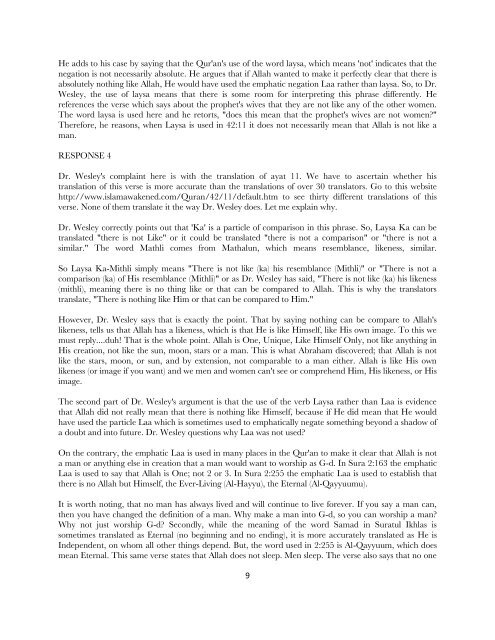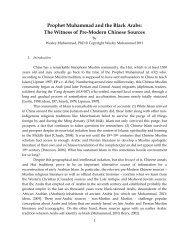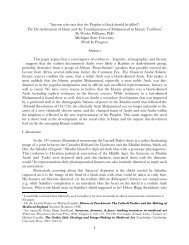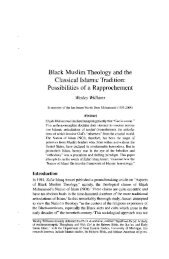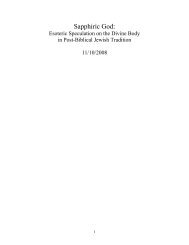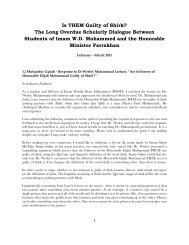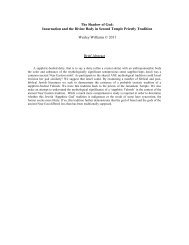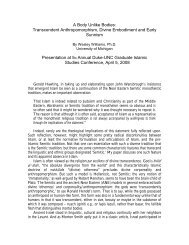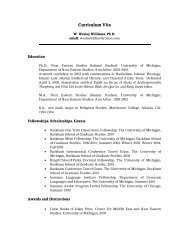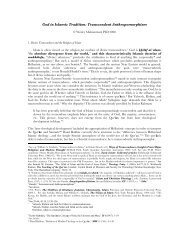Is THEM Guilty of Shirk? - Dr. Wesley Muhammad
Is THEM Guilty of Shirk? - Dr. Wesley Muhammad
Is THEM Guilty of Shirk? - Dr. Wesley Muhammad
You also want an ePaper? Increase the reach of your titles
YUMPU automatically turns print PDFs into web optimized ePapers that Google loves.
He adds to his case by saying that the Qur'an's use <strong>of</strong> the word laysa, which means 'not' indicates that the<br />
negation is not necessarily absolute. He argues that if Allah wanted to make it perfectly clear that there is<br />
absolutely nothing like Allah, He would have used the emphatic negation Laa rather than laysa. So, to <strong>Dr</strong>.<br />
<strong>Wesley</strong>, the use <strong>of</strong> laysa means that there is some room for interpreting this phrase differently. He<br />
references the verse which says about the prophet's wives that they are not like any <strong>of</strong> the other women.<br />
The word laysa is used here and he retorts, "does this mean that the prophet's wives are not women?"<br />
Therefore, he reasons, when Laysa is used in 42:11 it does not necessarily mean that Allah is not like a<br />
man.<br />
RESPONSE 4<br />
<strong>Dr</strong>. <strong>Wesley</strong>'s complaint here is with the translation <strong>of</strong> ayat 11. We have to ascertain whether his<br />
translation <strong>of</strong> this verse is more accurate than the translations <strong>of</strong> over 30 translators. Go to this website<br />
http://www.islamawakened.com/Quran/42/11/default.htm to see thirty different translations <strong>of</strong> this<br />
verse. None <strong>of</strong> them translate it the way <strong>Dr</strong>. <strong>Wesley</strong> does. Let me explain why.<br />
<strong>Dr</strong>. <strong>Wesley</strong> correctly points out that 'Ka' is a particle <strong>of</strong> comparison in this phrase. So, Laysa Ka can be<br />
translated "there is not Like" or it could be translated "there is not a comparison" or "there is not a<br />
similar." The word Mathli comes from Mathalun, which means resemblance, likeness, similar.<br />
So Laysa Ka-Mithli simply means "There is not like (ka) his resemblance (Mithli)" or "There is not a<br />
comparison (ka) <strong>of</strong> His resemblance (Mithli)" or as <strong>Dr</strong>. <strong>Wesley</strong> has said, "There is not like (ka) his likeness<br />
(mithli), meaning there is no thing like or that can be compared to Allah. This is why the translators<br />
translate, "There is nothing like Him or that can be compared to Him."<br />
However, <strong>Dr</strong>. <strong>Wesley</strong> says that is exactly the point. That by saying nothing can be compare to Allah's<br />
likeness, tells us that Allah has a likeness, which is that He is like Himself, like His own image. To this we<br />
must reply....duh! That is the whole point. Allah is One, Unique, Like Himself Only, not like anything in<br />
His creation, not like the sun, moon, stars or a man. This is what Abraham discovered; that Allah is not<br />
like the stars, moon, or sun, and by extension, not comparable to a man either. Allah is like His own<br />
likeness (or image if you want) and we men and women can't see or comprehend Him, His likeness, or His<br />
image.<br />
The second part <strong>of</strong> <strong>Dr</strong>. <strong>Wesley</strong>'s argument is that the use <strong>of</strong> the verb Laysa rather than Laa is evidence<br />
that Allah did not really mean that there is nothing like Himself, because if He did mean that He would<br />
have used the particle Laa which is sometimes used to emphatically negate something beyond a shadow <strong>of</strong><br />
a doubt and into future. <strong>Dr</strong>. <strong>Wesley</strong> questions why Laa was not used?<br />
On the contrary, the emphatic Laa is used in many places in the Qur'an to make it clear that Allah is not<br />
a man or anything else in creation that a man would want to worship as G-d. In Sura 2:163 the emphatic<br />
Laa is used to say that Allah is One; not 2 or 3. In Sura 2:255 the emphatic Laa is used to establish that<br />
there is no Allah but Himself, the Ever-Living (Al-Hayyu), the Eternal (Al-Qayyuumu).<br />
It is worth noting, that no man has always lived and will continue to live forever. If you say a man can,<br />
then you have changed the definition <strong>of</strong> a man. Why make a man into G-d, so you can worship a man?<br />
Why not just worship G-d? Secondly, while the meaning <strong>of</strong> the word Samad in Suratul Ikhlas is<br />
sometimes translated as Eternal (no beginning and no ending), it is more accurately translated as He is<br />
Independent, on whom all other things depend. But, the word used in 2:255 is Al-Qayyuum, which does<br />
mean Eternal. This same verse states that Allah does not sleep. Men sleep. The verse also says that no one<br />
9


